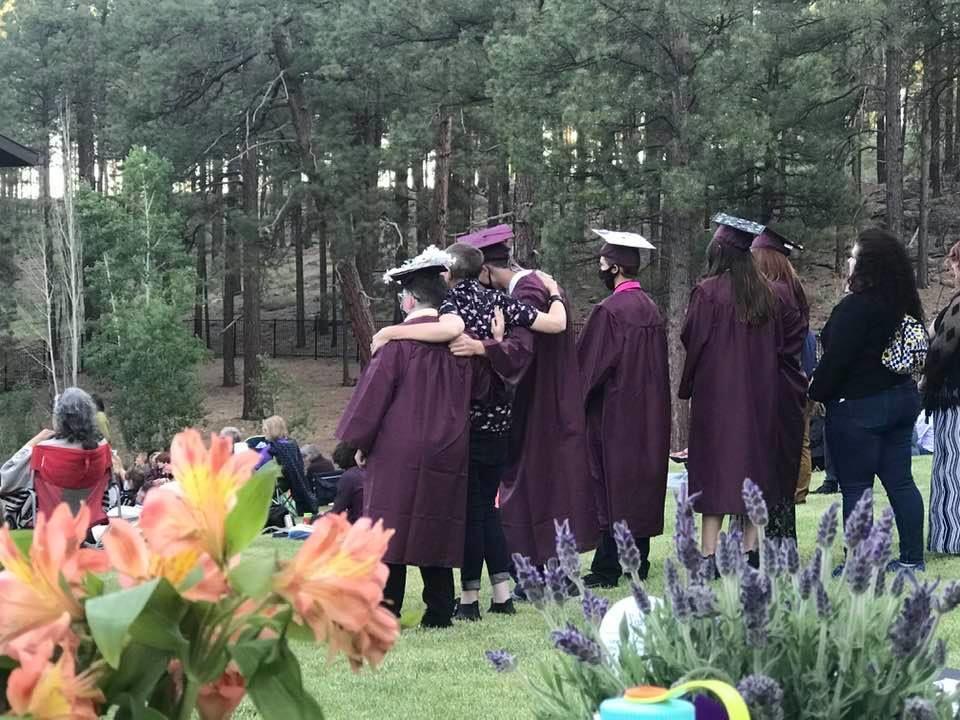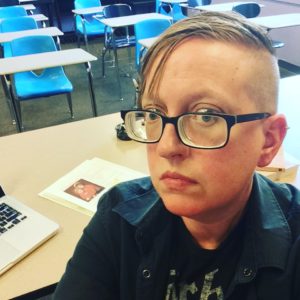
My sister, in town from Chicago for the first time in two years, caught this moment I shared with my students during the Flagstaff Arts & Leadership Academy Commencement ceremony.
We did what we’d been doing for a long time: we held each other up.
Outside of pictures like this one, I snapped very few photographs during graduation or my sister’s visit.
True togetherness feels more essential now.
The kind where the cell phones are down, eye contact is being made, and – if safe – hugs are being given and received.
“Can I hug you?” I asked students – both current and former – at graduation.
Can I give you a hug? Has always been a good question prior to hugging anyone, especially a child, but now the question has taken on new connotations.
I was not merely asking my student for “permission” to “make contact,” but I was now asking, “Are we safe enough for me to be near you?”
This is something we all lost, as Americans, since an openly white supremacist man occupied the White House, since the pandemic started and we all had to hide away – safety.
As I begin to process the trauma that was American Education in 2020-2021, I am proud of myself in this one way: I tried my best to always make my students feel safe.
On Tuesday, I will turn 45.
I have no hang-ups about freely admitting my age. Given my health history, it’s just short of a miracle that I lived past 30.
Forty-five years is a good stretch for a woman in America.
Especially a lesbian, a cancer patient, an educator.
Especially as women, we should view every birthday as a badge of honor. A badge representing our resilience and adaptability in our efforts to survive, and survive with dignity, charm, and (if nothing else) a little grace.
Sarah and I are living in a new city, and I will soon be starting work at a new school in Tucson.
This month marks one year since I started the chemo-adjacent treatment I receive for metastatic breast cancer which, though it sounds scary, is mostly just one more life-threatening chronic medical condition.
Medical conditions bore me. My own medical conditions are no exception.
Given that many educators were leaving the school, the 2021 commencement ceremony audience was populated not only by the usual grandmas, grandpas, aunts, uncles, cousins, but also former students – going all the way back to my first year of teaching high school.
I was to give a commencement speech, but when I stepped on stage at Pepsi Amphitheater and looked out at a lawn full of familiar faces, I choked.
Not because of stage fright, though there was plenty of that, but because I was stunned to see so many friends, so much personal history, so much love.
I had lived in Flagstaff for eight years.
Longer than I lived anywhere else, but Chicago.
I have an incredibly complicated relationship with Chicago and Flagstaff and Milwaukee and Kenosha and basically everywhere I’ve ever left. I’m just not feeling this, but I do hope we can remain friends.
(Given that it’s Pride Month, I’ll give you this lesbian cultural info: in the lesbian world, “exes” almost always become “dear friends”)
I have a complicated relationship with America itself, so I suppose it stands to reason that Arizona would, in totality, trouble me, but Arizona also thrills me. There’s the severity of the wild, scrubby landscapes, the eccentricity of the inhabitants, the love in the small communities that dot our state every state in this nation called America.
We are not really a nation of states anymore, but one of communities.
When I stood on the stage in Flagstaff, overlooking nearly a decade worth of friends, students, memories – overlooking a community – I knew that I was all right. I was alive and loved in a country that wasn’t built with my peculiar queer female self in mind. Tenacity. Grit. Luck. How could I give a laundry list of advice to teenagers when my life’s greatest accomplishments, greatest joys have all been the result of a little talent, a lot of grit and ridiculous luck?
So I didn’t give a speech. Not exactly.
I hope every reader gets a chance to stand on a stage while the sun sets and look out over people who love you and who you love in kind, picnicking on a lawn one summer night after a pandemic. That is a joy and a thrill to behold.
Sugar Hill, the neighborhood in Tucson where Sarah and I rent a wonderful home, was the first Black neighborhood in this American city. My pale presence here is as good a sign as any that the area is beginning to gentrify.
The school where I will be teaching encourages students and faculty to make use of hired mediators if one feels unsafe or if there is a conflict in lieu of calling the police. When my boss relayed this school culture detail, my heart soared.
My new school is on a city block in a real, actual American city that has real, actual American city problems like lack of healthcare, rampant drug and alcohol addiction, financial insecurity, homelessness and often a confluence of those factors cause trouble with us humans. Human trouble needn’t always involve police.
If we are a nation of communities, then I am now a new member of the Tucson community. As such, I am learning the customs, and everyone who lives here is my neighbor. I would like to be friends with my neighbors – even the drunk old guy who was urinating outside of the bank. Maybe we’ll not be best friends, but maybe we can know each other’s names someday.
As an educator, I’ve always put an emphasis on learning student names or preferred names because I know that when we bother to learn someone’s name, we are bothering to demonstrate true compassion toward another human being. That’s powerful.
When I moved to Flagstaff, I did not arrive with compassion. I arrived to get my wife and move back to Chicago as soon as humanly possible.
With Tucson, I made the decision to approach the move with compassion. I decided to like Tucson before I really got to know Tucson. I decided to treat Tucson as home now whether or not it will be going forward.
As a cancer patient, as a woman who is firmly in mid-life (hell, given my myriad conditions, I’m probably in my Golden Years), I am okay with the “unknown” except where it concerns where my next scan, infusion, or paycheck is coming from.
I’m comfortable with the unknown.
Used to be that I dealt with the unknown by trying to solve it.
Today, I understand that the unknown is not about the answer, but the search. To practice rigorous honest and vigilant curiosity is spiritual cardio.
And maybe in all my nervousness, standing to give the Class of 2021 a commencement speech, that’s what I forgot to say: this strange unknown? This is your life.
The other night, I ate three dark chocolate vegan bonbons and one single tortilla chip for dinner.
Sarah was puzzled. “Vegan, yes, but I’m not sure it’s good for you,” she opined. She also firmly believes in the “three squares” or at least eating a few small meals throughout the day. I’m sure this is a reasonable way to live, and maybe someday I will eat three small meals a day, but as a new friend recently said, “Who the f$%k wants to shove food in their face first thing in the morning? You’re a grown woman who’s been through a lot. Eat when you want to eat.”
Community is essential.
Sometimes you need a second opinion on a diagnosis, a document, or a “dinner.”
I never knew I would be vegan-ish. I never knew the cancer would come back. I never knew I would meet a group of dynamic, older women here in Tucson who would hold me up, as I held up my 2021 graduates, when the staggering load of all the unknown feels unbearable.
Community leads you back to health, your senses and, if you’re lucky, they make you laugh.

